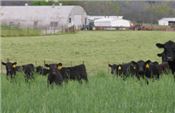Cold Weather Is Ideal Forage Prep Time, Says UT Expert

Cold days can still provide opportunities, especially in forage planning.
Image courtesy UTIA
Forage Expert Gives Three Ways To Take Advantage Of Cold Temps
KNOXVILLE, TENN.
While cold weather may mean a cup of coffee curled under a blanket for some, for others, like Tennessee’s beef producers, it means spring is just around the corner. According to Dr. Gary Bates, professor and director of the University of Tennessee Institute of Agriculture’s Beef and Forage Center, winter is an ideal time for several forage tasks. In a new Facebook live video, Bates gives information about how to take advantage of cold temperatures and prepare for spring.
Late winter months are an especially good time to test your soil. According to Bates, “If you haven’t soil tested in a couple of years, the next month will be the best time to figure out what levels of potash and phosphate are in the soil. This way, when it is time to fertilize in March, you know exactly what to use for fertilizer.”
The expert continues, “Now is also a great time to scout your fields for weeds. If you didn’t spray your fields during the warm days of December, you can wait for the right time and spray now. In order to spray your fields safely, you need three consecutive days in which the high is 60 degrees Fahrenheit or above. When this occurs, you can spray the third day.”
Gates suggests that mid to late February is the ideal time to plant clover as well. Right now, producers can identify which fields will be seeded, and how much seed is needed. Bates suggests two pounds of white clover and four pounds of red clover per acre. ∆